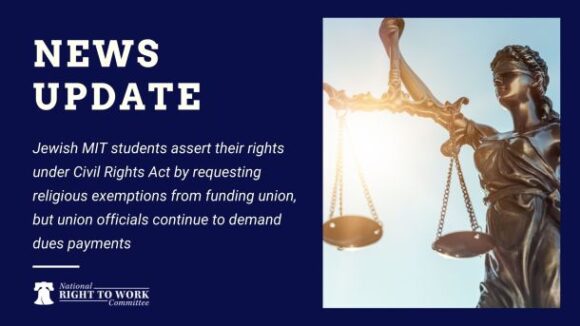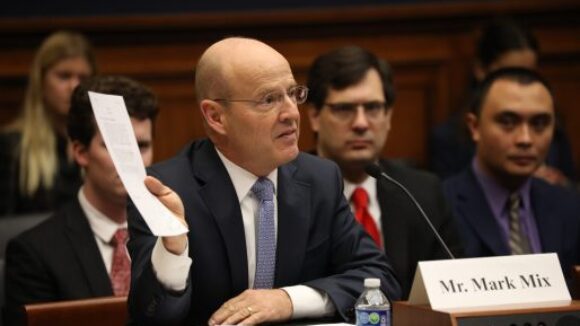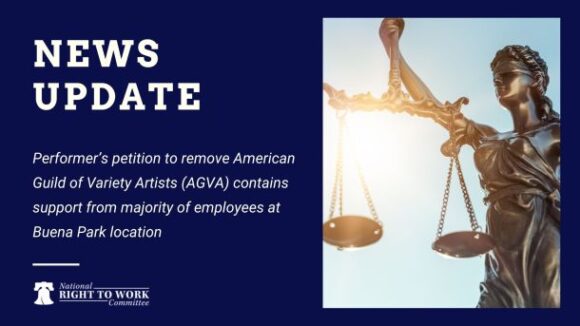Apologists for government-imposed forced unionism today still uphold a vision of “freedom” for employees reminiscent of the one once propagated by Soviet founder Vladimir Lenin. After seizing control of Russia in 1917, Lenin almost immediately ordered the destruction of all political parties other than his own Communist Party.
However, for a time the dictator continued to profess support for “freedom of debate” within the Communist Party.
Assisted by federal and state law, modern-day union officials also create a kind of “one-party state” in the workplace. No individual employee or rival employee group is permitted to challenge the “exclusive” (monopoly) privilege wielded by a government-certified union to speak for all employees.
Like Lenin, forced-uni0nism apologists justify single-party rule over the workplace with claims that dissenting workers have “freedom” to advance their views within the union. But as the National Labor Relations Board (NLRB) has confirmed time and again over the years, “freedom” within a union that you aren’t free to leave is a fanciful notion with no more substance than the Leninist version of “freedom.”
For example, in 2000, the NLRB baldly stated that unionized workers who join a union so they can have at least some influence over its actions have no grounds to protest if union officials disregard how the majority of members vote on a contract. The 13-year-old ruling in ILA, Local 1575 applies to millions of employees who are forced under federal law to accept a union as their monopoly-bargaining agent and may also be forced, unless protected by a state Right to Work law, to bankroll the union.
In a short news analysis for the Washington Examiner blog posted last night (see the link below), Sean Higgins suggest that the lack of Big Labor accountability to employees is a key reason why the forced-unionism state of Washington may lose out on the thousands of jobs Boeing will create when it begins production of its new 777x jet airliner.
Until a few weeks ago, Boeing had openly planned to manufacture the 777x in the Evergreen State. After workers’ rejected a proposed contract negotiated by Boeing and the International Association of Machinists (IAM/AFL-CIO) union hierarchy last month, however, the company announced it would consider other locations, including several in Right to Work states.
Higgins plausibly contends that an important reason why most Boeing employees in Washington State suspected the IAM brass had not gotten a good deal for them is that top bosses of the union are notorious for suppressing challenges to themselves:
The Wall Street Journal noted Saturday just how hard it is for a non-incumbent to get on the ballot for a leadership position: It requires endorsement from at least 25 of the union’s approximately 900 local lodges. In a January election, the most endorsements a non-incumbent got was three.
That candidate, Karen Asuncion, “alleged in a complaint with the Labor Department that some locals provided little or no notice of nomination meetings,” the Journal reported. In August, theLabor Department ‘s investigation confirmed Asuncion’s complaint, among other violations.
Higgins might have added that, while the IAM may be somewhat exception, a lack of serious challengers to top union officers at the local and international levels is the norm in U.S. unions today. But the fact that Big Labor’s boasts about “democratic control” of unions have no substantial basis either in labor law or in common practice isn’t the real scandal.
The real scandal is that so many elected officials use “union democracy” as a rationalization for forcing workers who aren’t union members to accept unwanted union monopoly bargaining and pay union tribute.
Human experience all around the world shows that freedom can’t be doled out in bits and pieces. Without the personal freedom to quit or refuse to join the union, you won’t have freedom within the union, either. That’s an important reason why the National Right to Work Committee is determined to enact legislation repealing all federal labor-law provisions authorizing forced union dues and fees.


